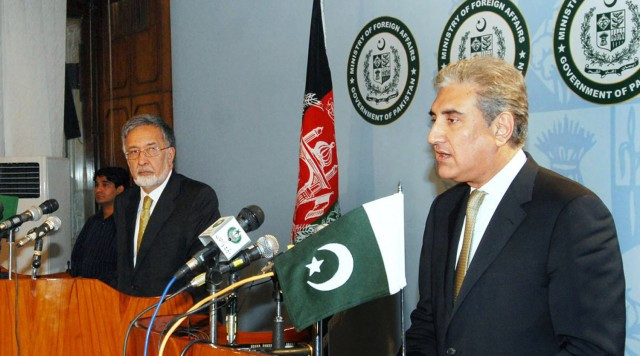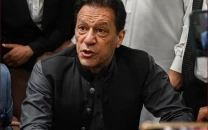Pak-Afghan territories not to be used against each other
Pakistan and Afghanistan said they would not allow their territories to be used against each others’ interests.

According to a joint statement issued on the conclusion of the two-day visit of Afghan Foreign Minister Zalmai Rassoul, during which he met the prime minister, president and the foreign minister, Pakistan and Afghanistan reiterated that bilateral relations of the two countries were based on respect for each other’s sovereignty, territorial integrity and non-interference in internal affairs.
The statement said that there is the need to strengthen economic and commercial ties and to facilitate trade and transit. They reaffirmed their commitment to enhance cooperation and coordination bilaterally as well as within the framework of regional and international agreements to counter terrorism.
Prime Minister Yousaf Raza Gilani urged Afghanistan in his meeting with Rassoul to ensure that its territory is not used by any country to destabilise Baluchistan. Gilani also added that both countries need to work closely to avoid misunderstandings or problems regarding the water issue.
The prime minister added that Pakistan wants the installation of biometric system and increase in the number of check posts to reduce illegal cross border movement from both sides.
He also reiterated Pakistan’s desire for the construction of road link from Chitral to Tajikistan and the import of electricity from Tajikistan and sought Afghan government’s assistance for the implementation of both projects. Rassoul said that he would bring these matters to the attention of the authorities concerned.
Rassoul said that without Pakistan’s cooperation, the Afghan government cannot succeed in restoring peace. He told Gilani that Afghanistan was in the process of finalising its water policy and intended to closely coordinate with Pakistani authorities to avoid any misunderstanding.
Meanwhile, the two foreign ministers reiterated their commitment towards an early finalisation of the Afghanistan-Pakistan Transit Trade Agreement.
Foreign Minister Shah Mah-mood Qureshi reaffirmed Pakistan’s full support to the roadmap announced by President Hamid Karzai and to the Afghan-owned and Afghan-led process of reconciliation. Qureshi also assured full cooperation and assistance to ensure the success of the forthcoming Kabul Conference, scheduled for July 20.
Both ministers agreed that parliamentary exchanges should be encouraged as much as possible and decided to establish a “Joint Education Commission” to facilitate and coordinate bilateral cooperation in the field of education.
Qureshi and Rassoul also agreed to establish a “Joint Commission on Border Cooperation and Visa Regime” to facilitate and oversee cross-border movements.
In addition, they said that they have agreed to initiate the “Silk Route CEOs Forum” through the Chambers of Commerce and Industries and the private sector. The ministers also agreed on establishing “Pakistan-Afghanistan Reconstruction Consortium” to identify reconstruction projects in Afghanistan to be funded by Pakistan.
In order to facilitate the visits of journalists, poets, writers, musicians and artists, they agreed to establish a “Pakistan-Afghanistan Information and Cultural Foundation” to be co-chaired by information ministers.
Meanwhile, President Asif Ali Zardari said during the meeting with Rassoul that a stable, prosperous and peaceful Afghanistan is in the interest of Pakistan, adding that it supports the Afghan-led process of political reconciliation and efforts for stability. “Pakistan is ready to assist Afghanistan in all possible manners for the development of infrastructure and strengthening of its institutions,” he said.
Highlighting the importance of strengthening bilateral engagements and of developing institutional mechanisms to promote cooperation in various areas, Zardari said that Pakistan could organise training programmes for civilians as well as for the Afghan National Army and Police.
Discussing the Afghan refugee issue, Zadari said that Pakistan continues to host some three million refugees and would like them to return to their homes so that they could play their roles in the reconstruction of Afghanistan.
Agencies, with additional reporting by Naveed Akbar
Published in The Express Tribune, June 26th, 2010.



















COMMENTS
Comments are moderated and generally will be posted if they are on-topic and not abusive.
For more information, please see our Comments FAQ